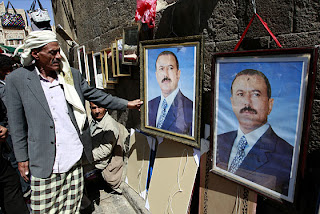I'm the President. I love me. No, no, really, I do.
(With apologies to The Beatles).
Tunisia.
At the end of last year, it was not the most obvious place for an Arab revolution. Yemen has an active tribal and Islamist insurgency, Syria was slightly more oppressed in the 2010 Freedom House index, and Egypt was heading for another illegitimate election in which President Mubarak's amusingly ironically entitled "National Democratic Party" would save everyone the trouble of having to decide between too many qualified candidates.
The self-immolation of Muhammad Bouazizi in the main square of Sidi Bouzid last December 17th was a visceral cri-de-coeur, but in even a moderately effective police state should have posed no major threat to an entrenched regime. So why did it lead to a snowball of protest that led to the President and his cronies fleeing by jet without anywhere to go - until Saudi Arabia accepted them after France demurred?
More importantly, will this herald a wave of liberalisation across the Middle East, and should western policy evolve - and if so, how?
It's easy to be wise after the event. Yes, President Ben-Ali's wife's Trabelsi clan was "intensely disliked" according to a July 2009 US Embassy cable leaked to wikileaks
, yes it was madly corrupt, with few opportunities for young graduates like the unfortunate Mr. Bouazizi, yes it was politically oppressive with lots of Presidential portraits around and about (see picture above). But in these things it was hardly alone, and compared with the autocracy of Morocco or the two decades of war / near war next door in Algeria, Tunisia was a bastion of stability in an unstable region.
And that's the point. The west, led by France, supported a kleptocratic regime largely, it seems, for fear of something worse. But in so doing, we connived in blocking the legitimate aspirations of the Tunisian people to have a say in their governance, whilst the West (rightly) pushed other despotic regimes towards democracy and human rights, with sanctions if necessary (e.g. Zimbabwe). In short, we abandoned the people to their Government to promote short-term stability. The historians amongst you may detect certain similarities to western policy in Persia in the late 1970s.
Zhou Enlai, Mao's first Premier of the People's Republic famously opined that "It is too soon to tell" the impact of the French Revolution, and so it is here. But the challenge to the West is simple: do we repeat the mistakes of Iran and support oppressive regimes because they happen to be vaguely pro-Western, driving our natural allies in the educated and middle classes into the arms of other - often virulently anti-Western Islamist - opposition? Personally, I'd be much happier if we were more overt in helping our allies democratise now before something potentially much worse takes over. Let's start with Egypt - and be prepared to take aid off the table if the NDP aren't willing to have a free and fair election.
That, and free and fair elections in Tunisia, would be a fitting epitaph for Mr. Bouazizi. May he rest in peace.










